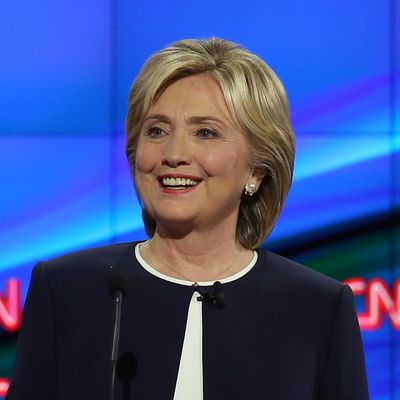
Hillary Clinton’s campaign spent most of the last year descending inexorably into depression and even panic. But the first Democratic presidential debate may have finally turned the tide, or at least stopped her fall. Clinton demonstrated that she was, by far, the best presidential candidate onstage. Indeed, she may have been the only person onstage actually running for president. Lincoln Chafee touted his lack of scandals as an oblique contrast to the front-runner. Martin O’Malley tried to play up his more left-wing position on the Glass-Steagall financial regulations. But none of them waged the kind of frontal assault that would be required to dislodge a front-runner who commands Clinton’s breadth of institutional support. Indeed, in what may be the most important moment of the debate, Bernie Sanders declared, to her insufficiently suppressed delight, “The American people are sick and tired of hearing about your damn emails.”
A second, and related, source of Clinton’s triumph is that she alone displayed the performative talent necessary to win a major party nomination. As a sheer communicator, she may ever-so-slightly outclass a Scott Walker, but she pales in comparison to at least a half-dozen Republicans: Figures like Donald Trump, Marco Rubio, Carly Fiorina, Rand Paul, Chris Christie, Mike Huckabee, perhaps even Jeb Bush, can put together more memorable sound bites. But whereas Walker’s performance came off as so pathetic that he had to abandon his campaign in disgrace, Clinton easily lapped the field. None of her opponents can plausibly imitate the public’s conception of a presidential nominee. Lincoln Chafee looked like he wandered into the building after his yacht had been lost at sea for weeks. Jim Webb snarled angrily about obscure obsessions. Martin O’Malley seemed to crave consideration as her vice-presidential nominee. Bernie Sanders is running for co-op president.
Clinton delivered a reasonably effective response to the question of whether she is a flip-flopper, framing her changes of position as responses to new information rather than (as is, in fact, often the case) changing political circumstances. None of her opponents attacked this weak point, allowing her flawed defense to stand unchallenged. Chafee did attack her for her vote to go to war with Iraq, but her response — that President Obama trusted her judgment enough to make her secretary of State — probably appeals to the instincts of the partisan Democrats she needs in the primary. (The answer wouldn’t help her with non-Democrats, but the Iraq vote is unlikely to come up in the general election when she faces a more hawkish Republican.)
Clinton attacked Sanders forcefully for two votes against gun control, which he feebly parried by citing his state’s rural character and the need to forge bipartisan consensus (a need that does not circumscribe any of his other policy stances). Sanders did not respond in kind. An interesting split between the two opened up between Sanders’s disavowal of capitalism and Clinton’s desire to “save capitalism from itself,” but, rather than dive into it, moderator Anderson Cooper quickly paddled on to more shallow waters.
Clinton came into the debate with a clear plan to position herself as Obama’s successor. Asked how she would not simply offer a third Obama term, Clinton replied that she would be the first woman president. Asked for a policy-based difference, Clinton proposed to extend and deepen Obama’s program rather than abandon or correct it.
It may be obvious in retrospect, but few people predicted beforehand just how thoroughly the debate atmosphere would play to Clinton’s advantage. The media has viewed her campaign message almost entirely through the filter of the email scandal. Clinton was able to use the poorly disguised partisan excesses of her Republican tormentors in Congress to escape responsibility for a serious error in judgment on her part, framing the issue (not altogether inaccurately) as a partisan fight, so that Democrats would rally to her side. She further played off the campaign media, casting its email obsession as an unworthy distraction from the policy discussion that she, her fellow candidates, and nearly all the Democratic voters want to hear. Clinton, suddenly finding a moral ground on which to stand (which the news media had denied her for months), burst out in uncontrollable glee.
She is not great at politics, as even many of her supporters concede. (Earlier today, Glenn Thrush and Annie Karni reported, “Nearly every one of 50 advisers, donors, Democratic operatives and friends we interviewed for this story thought Clinton was a mediocre candidate who would make a good president, if given the chance.”) But she is not as awful at it as she has appeared for most of 2015. After the debate, she again resembles what she appeared to be at the campaign’s outset: the all-but-certain Democratic nominee.






























